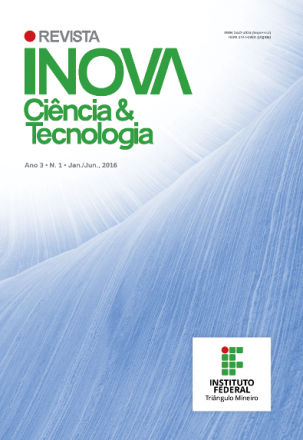EFEITO DA REFRIGERAÇÃO E LAVAGEM NA DETERIORAÇÃO FISIOLÓGICA EM PÓS-COLHEITA DE RAÍZES DE MANDIOCA
Revista Inova Ciência & Tecnologia
EFEITO DA REFRIGERAÇÃO E LAVAGEM NA DETERIORAÇÃO FISIOLÓGICA EM PÓS-COLHEITA DE RAÍZES DE MANDIOCA
Autor Correspondente: Dr. Igor Souza Pereira | [email protected]
Palavras-chave: AZULAMENTO, CONSERVAÇÃO,MANIHOT ESCULENTA CRANTZ.
Resumos Cadastrados
Resumo Português:
A mandioca é uma planta de importância alimentar, mas de elevada perecibilidade em pós-colheita que restringe seu potencial de mercado. O objetivo deste trabalho foi avaliar o efeito do pré-processamento (lavagem e refrigeração) na degradação fisiológica de raízes de mandioca (Manihot esculenta Crantz) variedade Castelinha. Foram realizados dois ensaios simultaneamente sendo um em temperatura ambiente (22ºC) e outro sob refrigeração (3ºC ±1) conduzidos em DIC no esquema fatorial (2X5), constituído por 2 formas de beneficiamento (lavada e não lavada) e 5 tempos de avaliação (24, 48, 72, 96 e 120 h após a colheita). A avaliação foi efetuada visualizando a área deteriorada nas fatias das raízes seccionadas. Os dados foram submetidos à análise de variância e regressão. Constatou-se deterioração fisiológica entre 48 a 72 h após a colheita quando as raízes foram mantidas sob temperatura ambiente. Nessas condições, a deterioração fisiológica observada nas raízes lavadas foi de quase três vezes superior àquelas raízes sem lavar. Não se constatou deterioração fisiológica até o final do período avaliado, quando as raízes foram conservadas sob refrigeração, lavadas ou não.
Resumo Inglês:
Cassava is a plant of food importance but have a very short shelf life that restricts its market potential. The objective of this work was to evaluate the effect of pre-processing (washing and refrigeration) on the postharvest physiological deterioration (PPD) of cassava roots (Manihot esculenta Crantz) cultivated variety Castelinha. Two tests were carried out simultaneously, one at room temperature (22ºC) and the other at low temperature (3ºC ±1) conducted in a DIC experimental design in the factorial scheme (2X5), consisting of 2 forms of treatment (washed and not washed) and 5 evaluation times (24, 48, 72, 96 and 120 h after harvest). The evaluation was done visualizing the deteriorated area in the slices of the sectioned roots. Data were submitted to analysis of variance and regression. PPD was observed between 48 and 72 h after harvesting when the roots were kept at room temperature. Under these conditions, the physiological deterioration observed in washed roots was almost three times higher than those without washing on average. No physiological deterioration was observed until the end of the evaluated period, when the roots were kept under refrigeration, washed or not.

